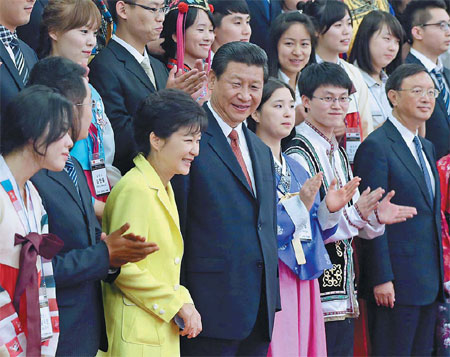Visit aids 'trust-building process'
Updated: 2013-06-28 08:05
By Wu Jiao and Li Xiaokun (China Daily)
|
||||||||
|
President Xi Jinping and his Republic of Korea counterpart Park Geun-hye enjoy time with youngsters from China and the ROK in Beijing on Wednesday. Wu Zhiyi / China Daily |
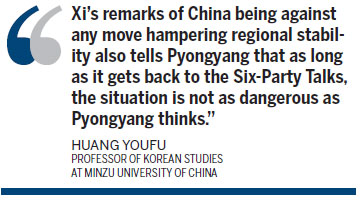
Chinese and ROK presidents committed to maintaining regional peace
Beijing and Seoul on Thursday stressed a joint commitment to the denuclearization of the Korean Peninsula and maintaining regional peace, calling for an early restart of the Six-Party Talks to realize that vision.
President Xi Jinping and Park Geun-hye, visiting president of the Republic of Korea, made the remarks as they met at the Great Hall of the People.
Observers said Beijing and Seoul are expected to see progress in their common understanding on the Korean Peninsula issue, and that China-ROK ties will achieve remarkable growth under the two new presidents.
The nations also agreed to reinforce bilateral strategic communication on political and security issues, which analysts said is conducive to the Northeast Asian situation.
Park, a self-taught fluent Mandarin speaker, arrived in Beijing earlier Thursday to kick off her four-day state visit.
It is her second overseas visit since taking office in February, after a US visit last month.
She has put the Korean Peninsula situation at the top of the agenda for her China trip.
"China is firm and serious about its commitment to denuclearize the Korean Peninsula," Xi said.
He added China is against any move undermining regional peace and stability and insists on solving problems through dialogue and negotiations.
Xi welcomed the "trust-building process" on the peninsula raised by Park. The process aims at containing the Democratic People's Republic of Korea's nuclear development, pushing its cooperation with the ROK and gradually building trust between the two.
He noted "positive changes" on the peninsula recently, calling for relevant sides to "seize the opportunity and work together to strive for an early restart of the Six-Party Talks".
While a planned meeting with Seoul fell through, Pyongyang has offered direct talks with Washington, and has sent two envoys to Beijing in the past four weeks.
Park said she appreciates Beijing's key role in pushing forward denuclearization and maintaining peace on the peninsula.
Seoul is committed to improving ties with Pyongyang on the basis of dialogue and trust, paving the way to final peaceful reunification of the peninsula, she said.
Huang Youfu, a professor of Korean studies at Minzu University of China, said the firm stance from both sides on denuclearization "gives a signal to Pyongyang that the way of nuclear development does not work".
"Xi's remarks of China being against any move hampering regional stability also tells Pyongyang that as long as it gets back to the Six-Party Talks, the situation is not as dangerous as Pyongyang thinks," Huang said.
"There will be a big leap between China and the ROK on the Korean Peninsula, and the meeting is a good start."
Yu Shaohua, director of the Department for Asia-Pacific Security and Cooperation Studies at the China Institute of International Studies, said it is hard to restart the Six-Party Talks immediately but it is possible to launch two-way or multilateral talks first.
In Thursday's talks, Xi also told Park that bilateral ties were at a "new historic starting point".
To elevate the ties, the presidents agreed on a basket of measures including reaching a "high-level" free trade pact at an early date and ensuring two-way trade hits the goal of $300 billion by 2015.
The neighbors started their FTA negotiations last year.
After the meeting, Xi and Park met youth representatives from both countries and officiated at the signing ceremony of a slew of cooperation documents on areas including trade, financing and technology. They also met reporters together.
Seoul-based Yonhap News Agency said the pacts will enable China to lower barriers to ROK enterprises and allow ROK companies to get involved in the development of West China.
The nations issued a joint statement on Thursday to enrich their strategic and cooperative partnership, outlining a blueprint for future development.
AFP said on Thursday that ties between Beijing and Seoul have always been colored by the Korean Peninsula nuclear issue and stagnated under Park's predecessor Lee Myung-bak, who focused his efforts on boosting Seoul's alliance with Washington.
Now "the hopes of a reboot have been bolstered" by the new leaders, it said.
Huang Youfu from Minzu University of China said compared with Lee's hard-line policies toward Pyongyang, Park's ideas are more favored by China.
"I believe China's ties with the ROK will see tangible progress. It is not about slogans, but concrete things in policies, security and civil exchanges. The ties will match the name of a strategic and cooperative partnership."
Huang said such progress is also important for Seoul, especially as Japan's right-wing forces rise.
Park will also meet Premier Li Keqiang and top legislator Zhang Dejiang, and will speak at Tsinghua University - reportedly in Mandarin - before she visits the ancient city of Xi'an, capital of Shaanxi province.
Contact the writers at wujiao@chinadaily.com.cn and lixiaokun@chinadaily.com.cn
(China Daily USA 06/28/2013 page1)
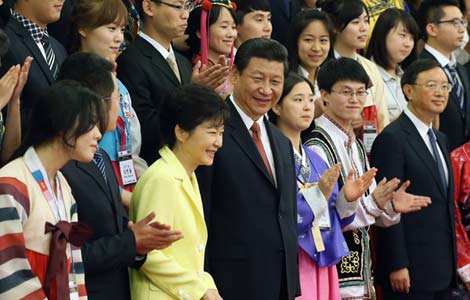
 Visit aids 'trust-building process'
Visit aids 'trust-building process'
 King of Pop returns
King of Pop returns
 Crowds cheer Court decision on gay marriage
Crowds cheer Court decision on gay marriage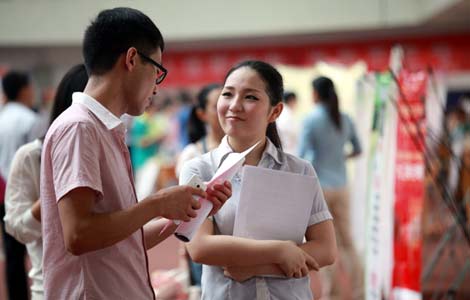
 Hiring index signals further job weakness
Hiring index signals further job weakness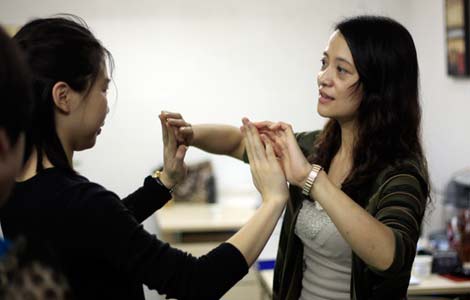
 Dance becomes popular stress relief
Dance becomes popular stress relief
 Philippine, US start Naval exercise in S China Sea
Philippine, US start Naval exercise in S China Sea
 Supreme Court gay rights ruling celebrated across US
Supreme Court gay rights ruling celebrated across US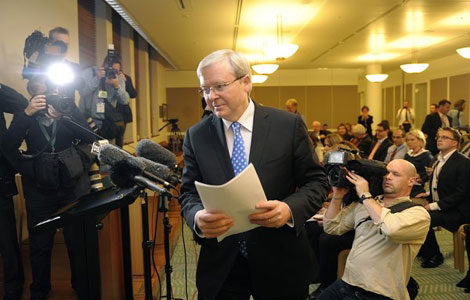
 Rudd returns as Australian PM after Gillard
Rudd returns as Australian PM after Gillard
Most Viewed
Editor's Picks

|

|

|

|

|

|
Today's Top News
Senate OKs immigration reform; hurdles remain
Snowden could request asylum in Russia: official
US collects Internet data on citizens
Boston bombing suspect accused in 4 deaths
816 elected in provincial leadership reshuffle
US adds to DPRK sanctions list
Chinese pros put trust in blogs
More Americans see Snowden as patriot: Poll
US Weekly

|

|
